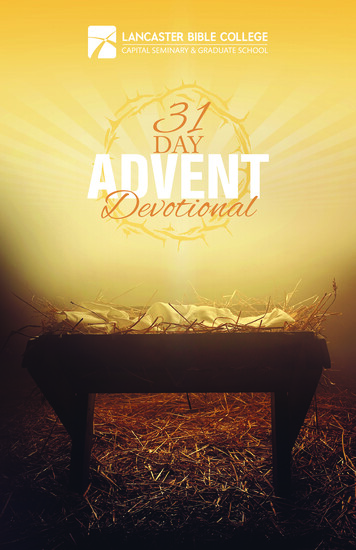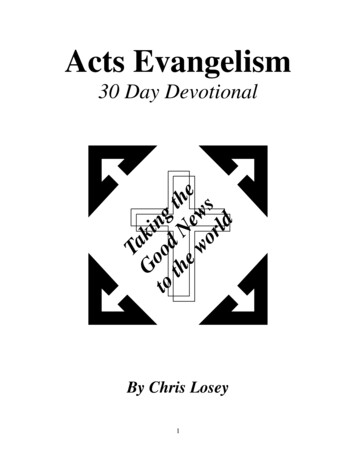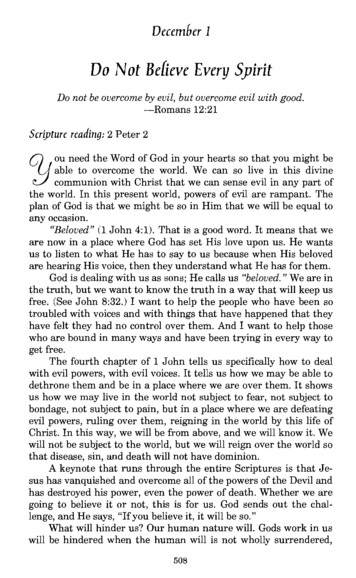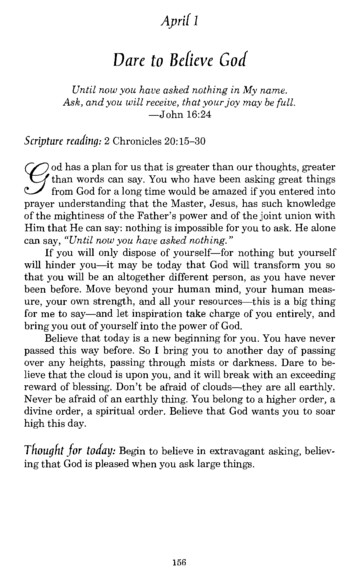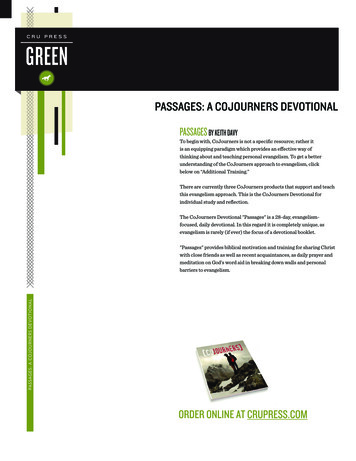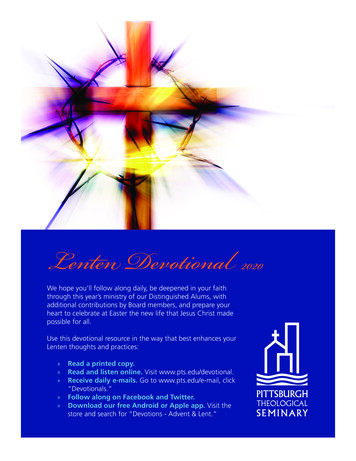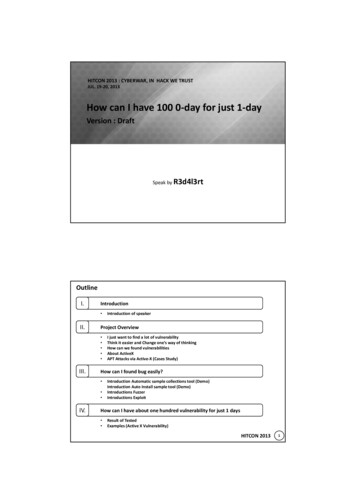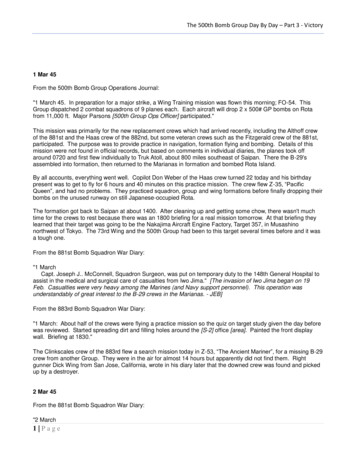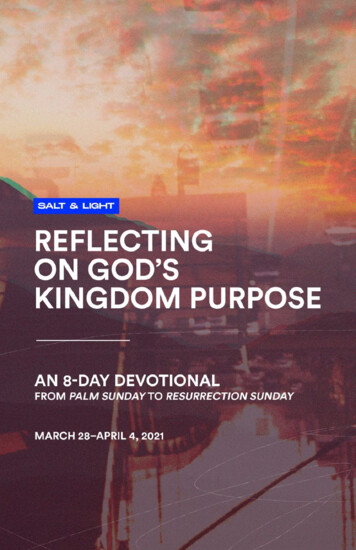
Transcription
SALT & LIGHTREFLECTINGON GOD’SKINGDOM PURPOSEAn 8-Day Devotional from Palm Sunday to Resurrection SundayMarch 28–April 4, 2021
2021 by Victory. All rights reserved.Scripture quotations, unless otherwise noted, are from The Holy Bible,English Standard Version (ESV ) Copyright 2001 by Crossway,a publishing ministry of Good News Publishers. All rights reserved.Permission to photocopy this material is granted for local church use.This is not for sale.victory.org.ph
ContentsIntroduction. 1Day 1: The Righteous King. 4Day 2: The King’s Provision. 7Day 3: The King’s Forgiveness. .10Day 4: The King’s Healing.13Day 5: The King’s Victory.17Day 6: The King’s Glory.21Day 7: The King’s Power.24Day 8: The Risen King.27
IntroductionThe whole world has now commemorated Holy Week twicein the coronavirus pandemic. Last year, when we abruptlyfound ourselves in a lockdown, we probably didn’t thinkwe’d be in the same situation come 2021. And while we aregrateful that God has allowed us to persevere and endure,we recognize that entering Holy Week again, in light ofeverything we have been through, has not been easy. Wehave experienced much loss, pain, and death, including thedeath of many hopes and dreams. We all have a longing inour hearts for normality.While we cannot imagine the endgame of this pandemicyet, the endgame of the world has been made known to us.Thousands of years ago, many prophets proclaimed andforetold the coming of the Messiah. Sometimes referred toas the fifth gospel, the book of Isaiah contains propheciesthat a Righteous King and a Suffering Servant would come.What Isaiah may not have completely understood was thatthese were one and the same, personified and fulfilled inour Lord Jesus Christ. Both the people of God in the timeof Isaiah’s prophecy and the disciples who followed Jesuscouldn’t fully understand what all this meant: A RighteousKing? A Suffering Servant? A hint of resurrection? Who coulddo this, and why did it need to happen?But we have the benefit of hindsight. We know and believe:Christ came. Christ died. Christ resurrected. And Christ willcome again.The passion week was the fulfillment of every Messianicprophecy given about Christ. The cross of Christ restoresand redeems everything we have ever hoped for. And whenthe disciples saw Christ resurrected, their hope and faithrose from the dead, too.
Through this devotional, for the next eight days, we willreflect on the life, death, and resurrection of Christ fromthe prophecies of Isaiah and the vantage point of Matthew.From what we know of Matthew, he grew up with a workingknowledge of Isaiah’s prophecies, quoting from and alludingto them.Our Lord and Savior Jesus Christ reigns as King over aneternal kingdom. He is both the Righteous King and theSuffering Servant Isaiah spoke of. The truth is, our mindsneed to be renewed, and this will happen as we reflect onour King and His kingdom purpose. We are not servinga baby Jesus who remains in a manger or a dying Jesushanging on a cross. We don’t live in fear of darkness ordeath, holding on to tradition or superstition. Jesus didcome as a baby and He did suffer on the cross. However,we are no longer trying to relive His suffering and death.We have appropriated what He has done for us and relatewith Him as the Resurrected King. Through His life andministry, we see snapshots of the coming kingdom. In Him,provision, forgiveness, healing, freedom, and victory areavailable for us today.We are not living in times of uncertainty. There is no morecertain thing than the coming of the Lord Jesus Christ andHis kingdom. When Jesus proclaimed repentance becausethe “kingdom of heaven is at hand” (Matthew 4:17), He beganpreaching an upside-down kingdom and a different way oflife that was to result in the Church permeating every cornerof the world. Today, like never before, the Church needs toproclaim this certainty: We are assured of victory and hopein Christ’s resurrection. Our King is in control. He is risen.From Palm Sunday to Resurrection Sunday, let’s journeytogether in appreciating and walking in the hope and victorywe have through the resurrection of our King Jesus. Themore we know Him, the more we will be changed by Him.SALT & LIGHTI n t r o d u cti o n2
As a result, we can be the salt and light He has called us tobe in this dark, distressed, and fallen world.“You are the salt of the earth, but if salt has lost itstaste, how shall its saltiness be restored? It is no longergood for anything except to be thrown out and trampledunder people’s feet. 14You are the light of the world. A cityset on a hill cannot be hidden. 15Nor do people light alamp and put it under a basket, but on a stand, and itgives light to all in the house. 16In the same way, let yourlight shine before others, so that they may see your goodworks and give glory to your Father who is in heaven.”13 MATTHEW 5:13–16SALT & LIGHTI n t r o d u cti o n3
DAY 1 MARCH 28The Righteous KingREAD Isaiah 11:1–9 Matthew 1:5–6, 21 Matthew 21:1–11There shall come forth a shoot from the stump ofJesse, and a branch from his roots shall bear fruit. 2Andthe Spirit of the LORD shall rest upon him, the Spirit ofwisdom and understanding, the Spirit of counsel andmight, the Spirit of knowledge and the fear of the LORD.1 ISAIAH 11:1–2REFLECTWhen God’s people welcomed Jesus on Palm Sunday, theyhad a longing. A longing to be taken out of their situation.A longing to be free of Roman rule. A longing for liberationfrom darkness. That’s why they welcomed Jesus. He was theKing they were hoping for.This was a longing that had been felt and passed downfor many generations. Even in the time of Isaiah, God hadallowed Assyria and Babylon to rule over His people, asjudgment against them. Because His people were stubbornin their sin, God ironically brought hope through judgment,so that they would turn back to Him. Judgment was notthe last word from God. In the midst of judgment, Isaiahprophesied a future hope: a shoot from the stump of Jessewould come. This prophecy referred to a king from the lineof David who would deliver God’s people from oppression.Though Jesus was the King they were hoping and longingfor, He was not the kind of king they expected. Yes, Jesus isthe Righteous King. But He is also the Suffering Servant.
Truth be told, we are not very different from the people whowelcomed Jesus on Palm Sunday. We are also longing forsomeone to rescue us from our challenges and difficulties.Rightly so, many of us look to Jesus for deliverance.However, He is not the kind of king we would expect.As we journey together this week, we will see this inScripture. He is a powerful and righteous King who did nottry to escape from suffering; He is the Suffering Servant whochose to go through our suffering. Jesus, our King, did notenter Jerusalem on a horse (an animal of war). Instead, Hechose to enter riding a colt (a beast of burden). Whereasa king on a horse would have come to subdue, Jesus cameto serve.His work of salvation would be on His terms, not ours.He gave us snapshots of His kingdom throughout His life.Instead of hunger, He made provision and multiplied bread.Instead of sin and condemnation, He brought forgivenessand redemption. Instead of pain and suffering, healingand deliverance. Instead of oppression, freedom andvictory. Instead of darkness, light and life. Instead of death,resurrection and glorification.Together, may we receive Christ not just as our rightful King,but in a manner that is right.Yes, Jesus is the Righteous King.But He is also the Suffering Servant.SALT & LIGHTT he Righte o u s Ki n g5
RESPOND1. What did you grow up thinking, believing, and doingfor Holy Week? How has that changed through theyears? What are you hoping to accomplish this weekas you take time to reflect on Christ’s life, death,and resurrection?2. What words or phrases stand out to you in Isaiah11:1–12? What do you think Isaiah thought or sawwhen he wrote this prophecy? How did Jesus fulfillthis prophecy?3. What kind of King do you think Jesus is? In what way doyou want to encounter Him this week? Jesus called usthe salt and light of the earth. How can your life be aglimpse of God’s kingdom on earth, as Jesus’ life was?SALT & LIGHTT he Righte o u s Ki n g6
DAY 2 MARCH 29The King’s ProvisionREAD Isaiah 43:15–21 Matthew 14:15–20Now when it was evening, the disciples came to him andsaid, “This is a desolate place, and the day is now over;send the crowds away to go into the villages and buy foodfor themselves.” 16But Jesus said, “They need not go away;you give them something to eat.” 17They said to him, “Wehave only five loaves here and two fish.” 18And he said,“Bring them here to me.” 19Then he ordered the crowdsto sit down on the grass, and taking the five loaves andthe two fish, he looked up to heaven and said a blessing.Then he broke the loaves and gave them to the disciples,and the disciples gave them to the crowds. 20And they allate and were satisfied. And they took up twelve basketsfull of the broken pieces left over. MATTHEW 14:15–2015 REFLECTAs we reflect on the passion week of Christ, it is good toremember that Christ came not only to die for our sins,but also to affirm and establish His kingdom here on earth.Jesus’ life reveals both the nature of the kingdom and thecharacter of the King. The characteristics of the kingdomemanate from the King. Because God is the RighteousOne and the Prince of Peace, His kingdom is a kingdom ofrighteousness and peace and joy in the Holy Spirit (Romans14:17). God revealed Himself to Isaiah as a sovereign Kingwith absolute power and authority over all the earth. Jesusalone has the power and ability to make a way in dead-endplaces and provide abundantly in desolate situations.
He masterfully demonstrated this in the feeding of themultitude. Here, we see that God’s divine mathematics isso different from our human mathematics. The disciplesonly had five loaves and two fish, which was probably goodenough to feed five people. This is the world’s math. Butin God’s math, the five loaves and two fish that were putin Jesus’ hands became more than enough to feed 5,000people. There were even twelve full baskets left over!Jesus reveals that there is abundant provision in thekingdom bypassing our human limitations. But the greatermiracle is the provision for the forgiveness of our sin.Jesus came to the earth to bring forgiveness, not just for5,000, but for all mankind. In this season, while we may feelhindered by the scarcity of resources and opportunities,let us remember and trust the character of our King. Christrevealed that He is our abundant provider for all our needs,and we can look to Him even in our most desolate places.Jesus alone has the power and abilityto make a way in dead-end placesand provide abundantly in desolate situations.RESPOND1. How does the feeding of the 5,000 give us a snapshot ofhow God provides for His people? What does this revealto you about God, His goodness, and His divine ability?SALT & LIGHTT he Ki n g ’s P r ovisi o n8
2. Recall a time when God supernaturally provided foryou when you were in dire need. Today, declare Isaiah43:15–21 over your most pressing situation.3. What is God telling you about giving to others? Howcan you obey Him? How can you make a differencein the lives of those around you through a lifestyleof generosity?SALT & LIGHTT he Ki n g ’s P r ovisi o n9
DAY 3 MARCH 30The King’s ForgivenessREAD Isaiah 52:13–53:12 Matthew 26:26–29He was despised and rejected by men, a man of sorrowsand acquainted with grief; and as one from whom menhide their faces he was despised, and we esteemed himnot. 4Surely he has borne our griefs and carried oursorrows; yet we esteemed him stricken, smitten by God,and afflicted. 5But he was pierced for our transgressions;he was crushed for our iniquities; upon him was thechastisement that brought us peace, and with his woundswe are healed. ISAIAH 53:3–53 REFLECTHave you ever hesitated or been ashamed to approachsomeone because you did them wrong? Growing up, wereyou ever scared of being punished for doing somethingwrong? Because we struggle with and fall into sin, wemay feel guilty, inadequate, and ashamed when we comebefore our holy and glorious King Jesus. Both believers andunbelievers feel this. In areas where we struggle the most,we ask for forgiveness, only to stumble again. Then we askfor forgiveness again, experience victory for a while, andeventually stumble again later.People may respond to this problem of guilt, fear, andcondemnation in two ways. Some feel that they can nolonger approach God with confidence. They wonder if Hestill loves and accepts them or if He will give up on themone day. On the other hand, some become desensitizedto sin and find that their hearts have hardened. They don’twant to become this way, but also don’t know how to
overcome this cycle of sin and experience the restoration oftheir relationship with God.The solution to sin and to both of these conditions isbasically the same: to reflect and meditate on the priceJesus paid for our sin and to walk in His victory. Jesus boreall our sins and guilt so we wouldn’t have to bear themanymore. He took all of the punishment we deserve—evenfor the sins we struggle with the most, for our indifference,and for the hardness of our hearts. He forgave all of oursins—past, present, and future. He experienced utterhumiliation in His suffering and death so that we couldstand before God without guilt, condemnation, or shame.And part of this new covenant is God forgiving our sinsand remembering them no more (Hebrews 8:12). Throughfaith in Him, not our own faithfulness or track record, wereceive and experience the forgiveness He paid for with Hissinless life.As we remember and reflect on these truths, we will beconfident in coming to God. Our hearts will be filled withgratitude and worship. When we ponder the shame,suffering, and death Christ endured for us to receiveforgiveness, our hearts will become tender towards Him.We will not give up when we struggle with sin, but beempowered to turn away from it. By His grace, we will evenreflect His love to others and extend forgiveness to thosewho sin against us.Jesus bore all our sins and guiltso we wouldn’t have to bear them anymore.SALT & LIGHTT he Ki n g ’s Fo r give n ess11
RESPOND1. Of the two responses explained above, which doyou relate with more? How are you growing in yourunderstanding of what Jesus did for you on the cross?How will this affect your daily life?2. Recall what you would consider the worst sin you haveever committed. Do you believe that Jesus has forgivenyour sins, including that one? Take some time to reflectand meditate on the price Jesus paid for your sin. Prayto walk in His victory, mercy, and grace.3. Think of one relationship you have that may need to berestored. This could be with a family member, friend,or even someone you interact with online. How do youfeel about this relationship? Are you willing to extendforgiveness and grace? What can you do about it today,in order to bring healing and peace?SALT & LIGHTT he Ki n g ’s Fo r give n ess12
DAY 4 MARCH 31The King’s HealingREAD Isaiah 53:4–5 Matthew 8:5–17Surely he has borne our griefs and carried our sorrows;yet we esteemed him stricken, smitten by God, andafflicted. 5But he was pierced for our transgressions;he was crushed for our iniquities; upon him was thechastisement that brought us peace, and with his woundswe are healed. ISAIAH 53:4–54 And when Jesus entered Peter’s house, he saw hismother-in-law lying sick with a fever. 15He touched herhand, and the fever left her, and she rose and began toserve him. 16That evening they brought to him many whowere oppressed by demons, and he cast out the spiritswith a word and healed all who were sick. 17This was tofulfill what was spoken by the prophet Isaiah: “He tookour illnesses and bore our diseases.” MATTHEW 8:14–1714 REFLECTIsaiah 53 is a prophecy that looked forward to Jesus Christ’ssuffering on the cross and its resulting benefits. In verse 4,the original words translated as griefs and sorrows mostoften referred to physical sickness and disease. However,in this passage, they were used metaphorically to referto a broader kind of sickness and disease, which includesall kinds of human afflictions: spiritual, psychological,emotional, and physical. We have already seen how Jesusdealt with our sin and guilt. Today, we will reflect on how Hissuffering also takes away our sickness and disease.
When Matthew described Jesus’ ministry of healing all thesick who came to Him, he quoted from Isaiah 53:4 usingthe most immediate application, “He took our illnesses andbore our diseases.” Here Matthew explains that Jesus is theone who fulfills this prophecy. It was not only through Jesus’healing ministry that this was fulfilled, but also throughHis suffering and death, since the Isaiah passage pointedultimately to these.The sacrifice Jesus paid for the forgiveness of sin is thesame sacrifice He paid for our healing and restoration.The kingdom He brings is characterized by righteousness,peace (wholeness), and joy, and those who are under Hiskingship experience these in increasing measure.Though God’s kingdom had already arrived when Jesuscame, it continues to grow and will be consummated whenHe comes back again to restore all things. Our freedomfrom sin and our perfected Christlikeness will ultimatelybe complete when Jesus returns. While awaiting our King’sglorious return, we can experience the forgiveness of oursins, be in right standing with Him, and continually becomemore and more like Him.So it is with our physical healing. We will experience thisin fullness when Christ returns. We will be transformedphysically and receive bodies that will never get sick, growold, or even die. Today, we can experience a foretaste ofthis when we are healed from various physical illnessesand diseases. We may all physically die, but death does nothave the final say. Whether or not we experience healingnow, our ultimate physical healing will come when our Kingreturns to fully establish His kingdom forevermore.SALT & LIGHTT he Ki n g ’s H eali n g14
Let us confidently approach God for healing from anysickness or disease, knowing that Jesus paid for this onthe cross.The sacrifice Jesus paid for the forgiveness of sin is thesame sacrifice He paid for our healing and restoration.RESPOND1. In what area of your life do you need healing andwholeness? Do you have complete faith in God’s wordand power to heal you? How has God been transformingyou to be more and more like Him?2. Reflect on Matthew 8:14–17 today. What does thispassage tell you about God’s power and ability to heal?How can you respond to this?SALT & LIGHTT he Ki n g ’s H eali n g15
3. Recall a relative, friend, or neighbor who may needhealing. Pray for him or her and believe God for healing.Ask God for ideas on how to minister to this personand the family, as well as for opportunities to preachthe gospel.SALT & LIGHTT he Ki n g ’s H eali n g16
DAY 5 APRIL 1The King’s VictoryREAD Isaiah 53:4–6 Matthew 8:16–17Surely he has borne our griefs and carried our sorrows;yet we esteemed him stricken, smitten by God, andafflicted. 5But he was pierced for our transgressions;he was crushed for our iniquities; upon him was thechastisement that brought us peace, and with his woundswe are healed. 6All we like sheep have gone astray; wehave turned—every one—to his own way; and the L ORDhas laid on him the iniquity of us all. ISAIAH 53:4–64 That evening they brought to him many who wereoppressed by demons, and he cast out the spirits with aword and healed all who were sick. 17This was to fulfillwhat was spoken by the prophet Isaiah: “He took ourillnesses and bore our diseases.” MATTHEW 8:16–1716 REFLECTThe prophet Isaiah revealed that the Suffering Servantwould bear the griefs and sorrows of His people. Thesewords speak of life’s pain and anguish and the resultingweakness. We’ve seen that this can be spiritual,psychological, emotional, or physical.The conclusion of Isaiah’s hearers was that this was God’spunishment upon the Suffering Servant. However, Isaiahexplained that this Suffering Servant was going to takeupon Himself the punishment we deserved. Isaiah declaredthat the Servant was acting wisely in what He was about togo through (Isaiah 52:13). Why was the Servant’s sufferingconsidered an act of wisdom? We realize from the rest of
Scripture that the wisdom of God is considered foolishnessby men (1 Corinthians 1:18), but it is in the “foolishness”of God’s ways, through the cross, that people would besaved (1 Corinthians 1:22–25). The prophet anticipatedthe horrible pain and suffering the Servant would have toendure, not as punishment for His own sins, but as thesubstitute for the people whom God wanted to save. It wasby the wounds inflicted upon Him that we would receiveredemption, healing, and victory.Gospel accounts like this in Matthew describe how Jesusfulfilled Isaiah’s prophecy. His work in healing and deliveringas He preached was a demonstration of the gospel of thekingdom. He not only healed Peter’s mother-in-law fromfever and others who were sick, but He also delivered manyfrom demonic bondage and oppression.To put it another way, the same sacrifice Jesus paid for theforgiveness of sin, He paid for our healing and restoration;not only that, it was the same sacrifice made to give usvictory over spiritual oppression.To be demon-oppressed or demonized means to beinfluenced by demonic powers, ranging from mildharassment to being dominated in mind and body so thatthe oppressed experience torment. This oppression canmanifest in various ways, such as irrational fear and anxiety,lust and perversion, uncontrolled anger and rage, prolongeddepression, and persistent addictions, among others. Thegood news is that through the work of Christ on the cross,we have been delivered from all the power of the enemy.Depending on the severity of the oppression, it might benecessary to ask those in our church community for prayer.Together, we believe that through the authority of Jesus’SALT & LIGHTT he Ki n g ’s Victo ry18
name and the power of the Holy Spirit, we can experiencefreedom from every demonic influence.Through the work of Christ on the cross,we have been delivered from all the power of the enemy.RESPOND1. Why do you think the supernatural world elicits differentresponses in people? What do you believe about it?Recall a time when you realized there was a certaindemonic influence in your life, from which you eventuallyexperienced freedom. How did you experiencespiritual freedom?2. Is there an area in your life where you think you areexperiencing harassment or torment from the enemyand feel hindered from freely serving Jesus? Do youbelieve that Jesus has complete authority over it? Whowill you talk to about this?SALT & LIGHTT he Ki n g ’s Victo ry19
3. What is your prayer and faith declaration for yourcommunity? How can you reflect the King’s authority andvictory over every area of your life?SALT & LIGHTT he Ki n g ’s Victo ry20
DAY 6 APRIL 2The King’s GloryREAD Isaiah 53:10–12 Matthew 27:45–54Yet it was the will of the LORD to crush him; he has puthim to grief; when his soul makes an offering for guilt, heshall see his offspring; he shall prolong his days; the willof the LORD shall prosper in his hand. 11Out of the anguishof his soul he shall see and be satisfied; by his knowledgeshall the righteous one, my servant, make many to beaccounted righteous, and he shall bear their iniquities.12Therefore I will divide him a portion with the many,and he shall divide the spoil with the strong, because hepoured out his soul to death and was numbered with thetransgressors; yet he bore the sin of many, and makesintercession for the transgressors. ISAIAH 53:10–1210 REFLECTThis passage in Isaiah brings us to the climax of thesuffering of the Servant, being crushed according toGod’s will. Even if He Himself had not sinned, the harshtreatment He received from the Lord’s hand was amazinglythe greatest act of His grace, because in this He becamethe substitute for those who had transgressed God’s laws.Isaiah pointed out that the Servant did this as an act ofintercession, which means to create a meeting betweentwo parties who are at odds with each other in order tomediate and bring reconciliation. This was fulfilled by ourLord Jesus Christ through His suffering and death on thecross, and continues to this day through His high-priestlyrole at the right hand of the Father, where He continuallymakes intercession for us (Hebrews 7:25). We are therefore
assured that God is able to completely save those who drawnear to Him through faith.Because the Servant sacrificed Himself, He will receive notonly satisfaction in His own soul from seeing the justificationof so many who were condemned, but He will also bevindicated and exalted by the Lord. The Servant is assuredthat after suffering comes His vindication. Even as Jesusbreathed His last, the centurion at the foot of the crosscould not help but declare, “Truly this was the Son of God!”(Matthew 27:54). Isaiah paints a picture of Jesus as a warrioralready victorious, dividing the spoils of battle amongthose who fought with Him (Isaiah 53:12). Paul declares inPhilippians 2:8–10 that because Jesus humbled Himself untodeath on a cross, the most humiliating form of execution forthe vilest criminals in the Roman empire, God exalted Himto the highest place and gave Him the name that is aboveevery name, that at the name of Jesus every knee should bowand every tongue confess that Jesus Christ is Lord, to the gloryof God the Father.Jesus was the Suffering Servant, demeaned and degraded.But in the end, because of His love and sacrifice for us,Jesus would receive the highest glory. Those who believe inHim can also take part in both His suffering and His glory,and as salt and light of the earth, we can reflect and spreadHis glory wherever we go.Because of His love and sacrifice for us,Jesus would receive the highest glory.SALT & LIGHTT he Ki n g ’s G lo ry22
RESPOND1. What does Isaiah say about the Suffering Servant inIsaiah 52:13–53:12? How does Christ’s substitutionarywork in bearing our punishment affect your view ofGod’s love and attitude towards sin?2. What does it mean to share in the suffering of Christ?How can you encourage others who are going through itnow? What is the reward of Jesus’ suffering, and how canwe share in His glory?3. What is the appropriate response to knowing that Jesusis interceding on your behalf continually and has beengiven the name that is above every name? How will thisaffect the way you tell others about Him?SALT & LIGHTT he Ki n g ’s G lo ry23
DAY 7 APRIL 3The King’s PowerREAD Isaiah 9:2 Isaiah 60:1–3 Matthew 4:14–16The people who walked in darkness have seen a greatlight; those who dwelt in a land of deep darkness, onthem has light shone. ISAIAH 9:2 REFLECTDarkness is often associated with gloom. For several monthsa year during winter, the northernmost nations of the earthexperience short days and long nights. Because of this,many of those living in these nations experience changesin their mood, oftentimes causing sadness, despair, andeven depression.The year 2020 was very challenging for everyone ondifferent levels. The effect of COVID-19 can be describedas a darkness—a shadow of death that has blanketed thewhole world. But a shadow is formed when something hasobstructed a light source, like what happens during a solareclipse. Black Saturday is traditionally seen as a very gloomyday because “Jesus Christ is dead.” The truth is, death couldnot overpower Christ—it was but a shadow cast temporarilyover the light of the world: Jesus!Darkness can never overpower light, for even the light castby a small match dispels the darkness around. That’s thepicture of the cross. It may seem like an image of defeatand death, but in reality it is the symbol of God’s ultimatetriumph outshining the power of death and sin. Jesus, thelight of the world, came not only to dispel the darkness
clouding the earth, but also the darkness that may be tryingto enshroud you personally today.When the magi encountered Jesus, their first response wasto bow before Him, because they realized that the brillianceof the star they had followed was nothing compared tothe light God had sent. Jesus will meet you in your deepestdarkness, whether that’s fear, anxiety, or despair. In Hislight, we will find the strength to carry on as Christ turns ourfear to faith, changes our despair to hope, and quiets ouranxiety with His love.Because of the power of God to defeat darkness, we in turnare empowered to touch the lives of others as bearers ofHis light on the earth.Christ turns our fear to faith, changes our despairto hope, and quiets our anxiety with His love.RESPOND1. What does “Black Saturday” mean for you? What did yougrow up believing about it? How does the Bible correctyour understanding?SALT & LIGHTT he Ki n g ’s P owe r25
2. In what area of your life or family are you experiencingdarkness? How can you hold on to the truth that Jesusis the light? Spend some time meditating on Isaiah 9:2today and ask God to dispel any darkness in your life,family, or community.3. What does Isaiah 60:1–3 say about light? How can yoube a light in the darkness for others? Pray that C
Through this devotional, for the next eight days, we will reflect on the life, death, and resurrection of Christ from the prophecies of Isaiah and the vantage point of Matthew. From what we know of Matthew, he grew up with a working knowled
